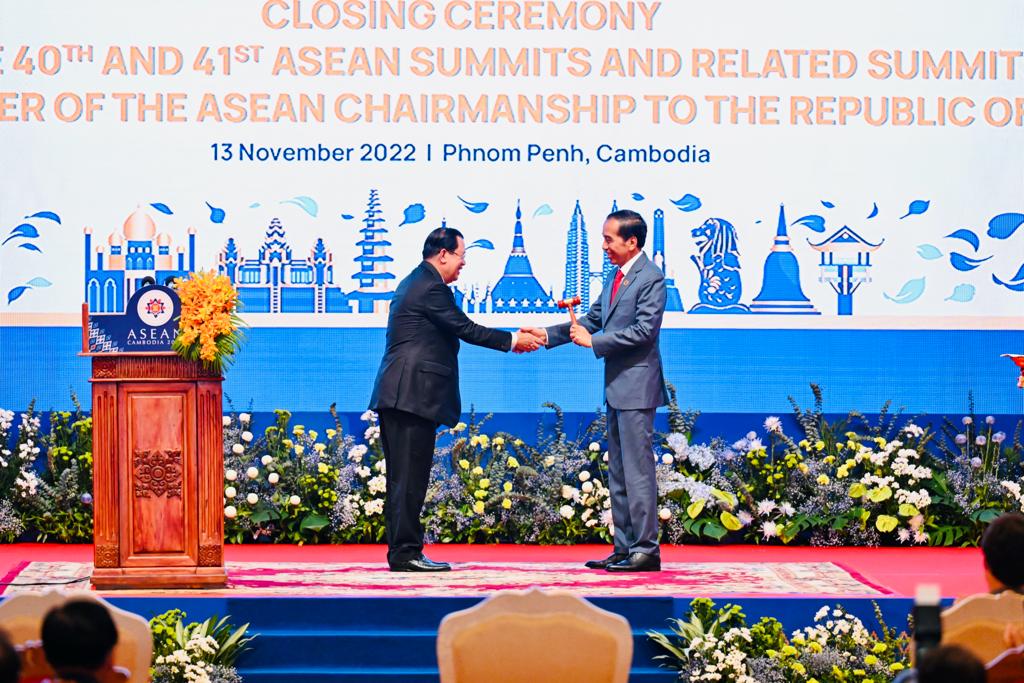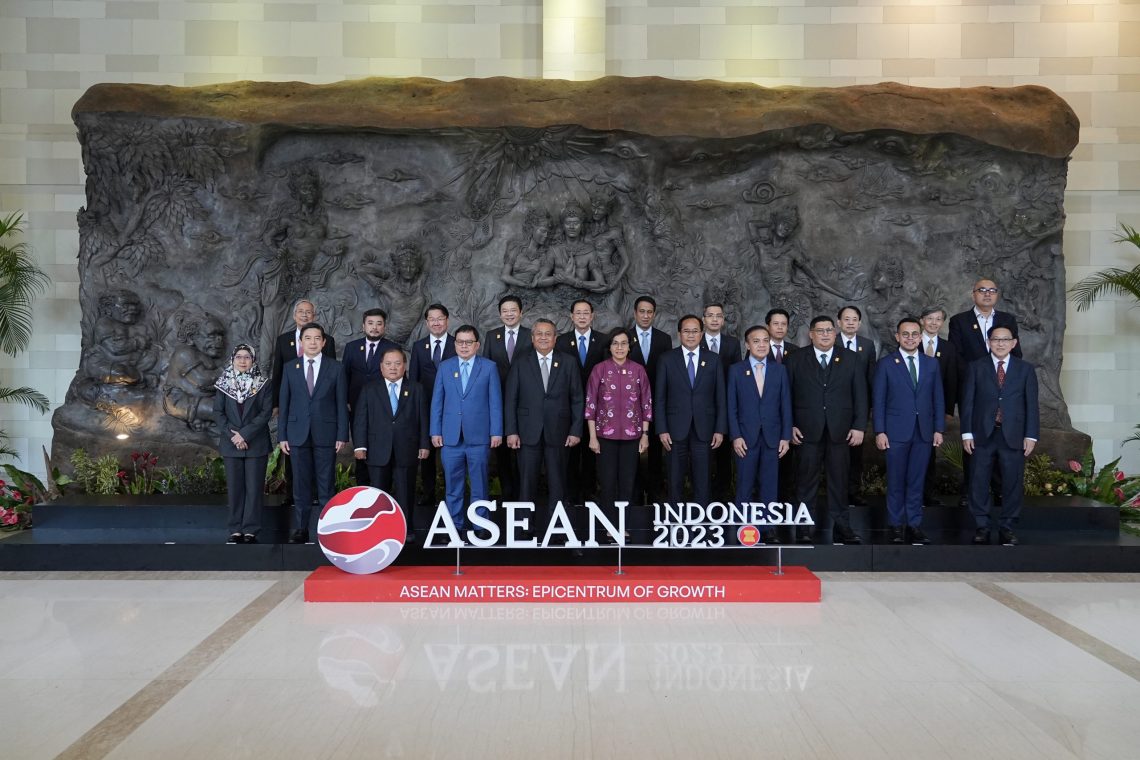![]()

(Indonesian Foreign Minister Retno Marsudi gives her remarks in the annual press conference Source: Jakarta Global)
Jatinangor, Wartakema – The throne for Southeast Asia’s largest regional organization has once again been subject to the annual leadership rotation. This year, it is Indonesia’s turn to head the bloc after being handed the presidency from Cambodia who held Chairmanship in 2022. As the largest state in the region, Indonesia is expected to carefully handle the current international environment where tension between major powers seems to be rising.

(Indonesian President Joko Widodo receiving the symbollic Chairman’s hammer from Cambodian PM Hun Sen
Source: Cabinet Secretariat of the Republic of Indonesia)
Highlights
ASEAN is well known for its three main pillars, which are the Political-Security Community, Economic Community, and the Socio-Cultural Community. This year’s chairmanship puts forward the Economic Community, emphasizing largely on regional economic growth. Indonesia takes ASEAN on the lead with the theme “ASEAN Matters: Epicentrum of Growth”, focusing on the role of the organization as a key player in global stability while improving the region’s institutional centrality. In order to grow the regional economy, three priority issues are declared which are Recovery and Rebuilding, Digital Economy and Sustainability, each focusing on current financial and economic trends.
The ASEAN Finance Ministers and Central Bank Governors Meeting (AFMGM) series is the high-level meeting of ASEAN representatives in the economic sector, taking place in the last week of March in Nusa Dua, Bali. Aside from that, annual meetings of ASEAN Foreign Ministers and ASEAN Defense ministers are also hosted by Indonesia this year. With such an important task to hold, it is time for Indonesia to once again show its international leadership capabilities.

(ASEAN Finance Ministers and Central Bank Governors on the sidelines of the AFMGM in Nusa Dua, Bali
Source: ASEAN)
The much awaited peak of the chairmanship, the 42nd ASEAN Summit, will be held in Labuan Bajo, East Nusa Tenggara Province, on the 9th to 11th of May 2023. With the Komodo Islands in the backdrop, the summit is attended by ASEAN state leaders, foreign ministers, and officials from the ASEAN Secretariat. However, the Prime Minister of Thailand will be unable to attend due to national elections that are going to be held in the proceeding days, instead sending his Deputy Prime Minister to attend the summit. Meanwhile, Myanmar is still barred from ASEAN events on the political level. This will be an important moment for host President Joko Widodo to address the crucial issues facing ASEAN directly with other heads of member states.
Challenges
Despite there being plenty of support and optimism for Indonesia’s chairmanship, this particular year is marked by multiple political challenges that must be addressed. To start off, the ongoing conflict in Ukraine has been one of Indonesia’s top foreign policy priorities, even since our G20 presidency last year. This issue causes concerns for Southeast Asia in the energy and food sector, since Ukraine and Russia are both major suppliers of wheat and gas. However, not all ASEAN member states share the same views. Countries with deep military ties to Moscow such as Vietnam and Laos have restrained from condemning Russia’s war on Ukraine. On the other hand, more western-linked states such as Singapore have already proceeded with sanctions against Russia, while others in the region remained neutral. In leading ASEAN, it is Indonesia’s task to balance between non-interference policies while also pushing for the mutual respect of independence, sovereignty and equality for all nations. However, it doesn’t seem like ASEAN member states’ sentiment regarding the issue will be unified any time soon.
The ongoing issue of Myanmar also faces a similar issue. ASEAN member states can’t seem to agree on a common stance, with some countries seeming to tolerate the Junta government while others directly denouncing them. The few things ASEAN member states can agree upon, however, is to demand the Junta to realize the Five-Point Consensus, a set of demands formulated in Jakarta by member states’ representatives urging the military government to cease violence, commence peace talks and accept humanitarian aid. The keyword here is “urge”, because in the two years since Myanmar’s government takeover by its military, the Junta has yet to make any meaningful progress towards the demands. Indonesia’s Foreign Minister Retno Marsudi states her country’s commitment to help Myanmar exit the political crisis by leading the new Office of Special Envoy to hold talks with all stakeholders and also involving the UN Special Envoy. We are yet to see more progress on the issue.
Other news emerged of attacks against an ASEAN Aid convoy, also consisting of Indonesian and Singaporean diplomats, in Northern Myanmar. It is unclear who the perpetrators were as of yet, however the incident raises tensions as it happened just ahead of the 42nd ASEAN summit with President Joko Widodo even addressing and condemning the attack during a press conference in Labuan Bajo on Monday. Not too long ago, other news of Indonesian victims of human trafficking in Myanmar went viral, prompting the President to address the issue of human trafficking during the same press conference. These serious issues concerning the safety of ASEAN member states’ citizens related to the ongoing conflict in Myanmar is a complicating factor that will be a difficult task to address in the summit.
With 2023 still wide ahead and open for possibilities, Indonesia finds itself in a central role of leadership doused in uncertainty. While Indonesia may find a lot of success in leading the effort of improving relations with external partners, some internal ones become more strained. No matter how progressively assertive the rhetoric from Jakarta becomes, Myanmar’s Military Junta does not seem like it is willing to slow down the bloodshed anytime soon. A good leadership is one that can be sustained well after it is passed down to its successors. Turbulent and complex issues such as those described above can’t be solved in the timespan of just one chairmanship. In order to tackle issues that ASEAN currently finds itself in, Indonesia must design its actions so that the momentum can be swiftly passed down to the state next in line of the chairmanship, Laos.
Penulis: Fareez Eldacca
Editor: Rifia Azka Nabiilah & Jeania Ananda Malik


